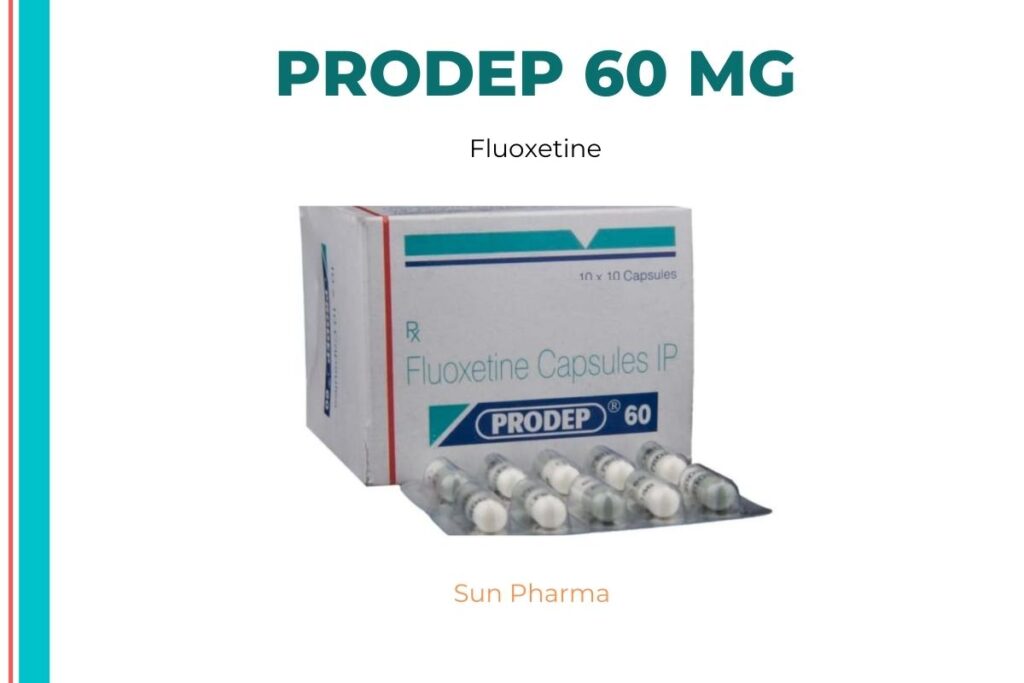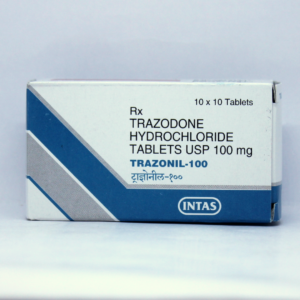Prodep 60
Antidepressants, such as Prodep 60, are used to treat major depressive disorder, obsessive-compulsive disorder (OCD), bulimia nervosa (eating disorder), and panic disorder. Depression is a mental condition marked by feelings of sadness, dissatisfaction, anger, hopelessness, or loss that interfere with daily tasks.
Fluoxetine, a selective serotonin reuptake inhibitor, is found in Prodep 60. It works by preventing nerves from reabsorbing serotonin, a mood-enhancing chemical messenger that talks between brain cells. This causes an increase in serotonin concentrations in the neuron synapse, which aids in mood regulation and depression treatment.
Prodep 60 can be taken with or without food. Take Prodep 60 exactly as directed. Depending on your medical condition and response to treatment, you should take Prodep 60 for as long as your doctor has prescribed it. Certain typical adverse effects, such as insomnia (difficulty sleeping), headache, diarrhea, nausea, weariness, dry mouth, loss of appetite, and indigestion, may occur in some circumstances. The majority of these adverse effects do not necessitate medical treatment and will subside with time. However, if you are experiencing these adverse effects on a regular basis, you should consult your doctor.
Please do not stop taking Prodep 60 on your own because withdrawal symptoms may occur. If you’re pregnant or breastfeeding, don’t take Prodep 60 unless your doctor tells you to. Prodep 60 may induce dizziness and impair your reactions, so do not drive or use machinery while taking it. Because the safety and effectiveness of Prodep 60 have not been proved, it should not be administered to children under the age of eight. Alcohol should not be used while taking Prodep 60 because it may cause dizziness. To rule out any negative effects, keep your doctor updated about your health condition and medications.
Depression, Obsessive-Compulsive Disorder (OCD), and Bulimia Nervosa are some of the conditions that Prodep 60 is used for (eating disorder)

Medicinal Advantages
Prodep 60 belongs to the selective serotonin reuptake inhibitors class of antidepressants. Major depressive disorder, obsessive-compulsive disorder (OCD), bulimia nervosa (eating disorder), and panic disorder with or without agoraphobia are all treated with Prodep 60. Prodep 60 works by preventing nerves from reabsorbing serotonin, a mood-enhancing chemical messenger that interacts between brain cells. This causes an increase in serotonin concentrations in the neuron synapse, which aids in mood regulation and depression treatment. Premenstrual dysphoric condition can also be treated with Prodep 60. (a severe form of premenstrual syndrome). Compared to other antidepressants, Prodep 60 has fewer side effects. Prodep 60 is a medication that is used in the treatment of bipolar disorder and treatment-resistant depression.
Use Instructions
Prodep 60 can be taken with or without food. Based on your medical condition and reaction to treatment, your doctor will determine how long you should take Prodep 60. Prodep 60 should be taken exactly as directed by your doctor. Prodep 60 should be swallowed whole, with a glass of water; do not chew or crush the tablet. Prodep 60 liquid is taken by mouth with the measuring cup provided in the package; shake the carton well before each use.
Store in a cool, dry location away from direct sunlight.
Prodep 60 Side Effects
I’m having trouble sleeping (difficulty sleeping)
Headache
Diarrhoea
Nausea
Fatigue
Mouth is parched
Appetite loss.
Indigestion
Drug Recommendations
If you are allergic to any of the ingredients, if you are taking or have recently taken monoamine oxidase inhibitors (MOA), or if you are taking metoprolol, do not take Fluoxetine (used to treat high blood pressure). If you take Fluoxetine with opioid antagonists like buprenorphine or naloxone, you risk developing serotonin syndrome, which is a dangerous disease. If you experience suicidal thoughts, such as murdering or injuring yourself, see your doctor right once. If you have or have had epilepsy, mania, glaucoma, diabetes, bleeding disorders, or hyponatremia, tell your doctor (low sodium levels). If you’re pregnant or breastfeeding, don’t take Fluoxetine unless your doctor tells you to. Fluoxetine may induce dizziness and impair your reactions, so do not drive or operate machinery while taking it. Fluoxetine should not be administered to children under the age of eight because its safety and effectiveness have not been proven. Alcohol should not be consumed while taking Fluoxetine because it may cause dizziness.
Interactions Between Drugs
INTERACTIONS BETWEEN DRUGS: Antihypertensive drugs (metoprolol, nebivolol), opioid antagonists (buprenorphine, naloxone), antibiotics (linezolid), antipsychotics (pimozide, thioridazine, lithium, risperidone), antidepressants (methylene blue/methylthioninium chloride, bupropion, Monoamine oxidase inhibitors), anti-arrhythmics (tamoxifen)
INTERACTIONS WITH FOOD AND DRUGS: Do not combine Fluoxetine with St. John’s wort (an herbal supplement used to treat depression). Alcohol should not be used while taking Fluoxetine because it may increase the sedative effects.
DRUG-DISEASE INTERACTION: Fluoxetine may interact with glaucoma, diabetes, epilepsy, mania, bleeding issues, hyponatremia (low salt levels), heart, liver, and kidney failure.
Safety Suggestions
ALCOHOL
Alcohol should be avoided when taking Fluoxetine because it can cause dizziness.
PREGNANCY
Fluoxetine is classified as a pregnancy category C drug. If you are pregnant, please see your doctor before taking Fluoxetine; your doctor will only prescribe if the benefits outweigh the dangers.
BREAST FEEDING
Fluoxetine can be found in breast milk. Consult your doctor before taking Fluoxetine; your doctor will determine whether or not Fluoxetine is safe to take during breastfeeding.
DRIVING
Fluoxetine might make you dizzy and impede your responses. If you have these symptoms, do not drive or use machinery.
LIVER
In patients with liver disease, dose adjustments may be necessary. If you have any worries about this or if you have a liver problem, please visit your doctor.
KIDNEY
In patients with kidney disease, dose adjustments may be necessary. If you have any worries about this or if you have kidney impairment, please visit your doctor.
No habit formation
Advice on Diet and Lifestyle
Maintaining a nutritious diet and exercising on a regular basis can assist to improve general health and self-esteem.
Attend counseling sessions on a regular basis.
Practice yoga and meditation. This helps to relieve stress and calm the body.
To improve the amount and quality of sleep you obtain, stick to a regular sleep schedule.
Fish, nuts, fresh fruits and vegetables, and olive oils are all good sources of omega fatty acids.
Amino acids are the building blocks of neurotransmitters. Meat, dairy products, and certain fruits and vegetables are high in amino acids, which aid in the appropriate maintenance of neurotransmitters.
Serotonin is stimulated by complex carbs (a feel-good neurotransmitter). Whole grains, legumes, spinach, broccoli, oranges, and pears are among them.
Exercising aids in the creation of natural antidepressants in the body. It also aids in stress relief, mood enhancement, self-esteem enhancement, and comfortable sleep.
Avoid smoking and consuming alcoholic beverages.
Learn about your condition, recognize the risk factors, and stick to the treatment plan prescribed by your doctor.
Additional Information: This item is non-refundable.
Concerns of Patients
Major depressive disorder, often known as clinical depression, is a mental health condition defined by a continuous and severe experience of melancholy over an extended period of time. Mood, behavior, and other physical systems such as sleep and appetite are all affected. Sadness, loss of interest, changes in food, sleep problems, restlessness, lack of energy, feelings of worthlessness or guilt, suicidal thoughts, difficulty concentrating, making decisions, and thinking are all symptoms. Depression’s specific cause is uncertain. However, stress, hormonal changes, alcohol or drug misuse, childhood maltreatment, certain medical disorders, and medications may all raise the chance of developing depression.
Obsessive-Compulsive Condition (OCD) is a mental disorder characterized by obsessive thinking (obsessions) and the need to repeat actions (compulsions).
Bulimia nervosa is a significant eating disorder characterized by binge eating followed by weight loss strategies such as vomiting, extreme exercise, or fasting.
Panic disorder is an anxiety disorder that results in panic episodes. When a person is in this position, he or she feels fearful even when there is no risk. Fast heartbeat, difficulty breathing, chest or stomach pain, weakness or dizziness, and sweating are all symptoms.
FAQs
Fluoxetine works by preventing nerves from reabsorbing serotonin, a mood-enhancing chemical messenger that communicates between brain cells. This causes an increase in serotonin concentrations in the neuron synapse, which aids in mood regulation and depression treatment.
Due to a reduction of appetite, fluoxetine may cause weight loss. Maintain a healthy weight by eating a balanced diet and exercising regularly. If you notice weight swings while taking Fluoxetine, please visit your doctor.
Do not stop taking Fluoxetine without first visiting your doctor, since this could cause withdrawal symptoms. Continue taking Fluoxetine for as long as it is suggested to effectively treat your illness. If you have any problems while taking Fluoxetine, don’t be afraid to tell your doctor; the amount may be progressively reduced.
Fluoxetine has been linked to decreased sex-drive, erection issues, and orgasm. If you have any concerns about this, talk to your doctor.
Fluoxetine may cause dry mouth as a negative effect. Limiting caffeine intake, avoiding tobacco and mouthwashes containing alcohol, drinking plenty of water, and eating sugar-free gum/candy may all help to stimulate saliva and prevent mouth drying.
If you have glaucoma, talk to your doctor before using Fluoxetine because it can cause increased eye pressure.
If you have diabetes, talk to your doctor before using Fluoxetine because it might cause blood glucose levels to vary. If you’re using Fluoxetine, you should keep track of your blood sugar levels on a regular basis. If your blood sugar levels are fluctuating, talk to your doctor.
Fluoxetine has been linked to an increased incidence of bone fractures. If you have osteoporosis, consult your doctor before using Fluoxetine. If you are experiencing bone pain, see your doctor.







Be the first to review “PRODEP 60 MG 10 Tablets”
You must be logged in to post a review.